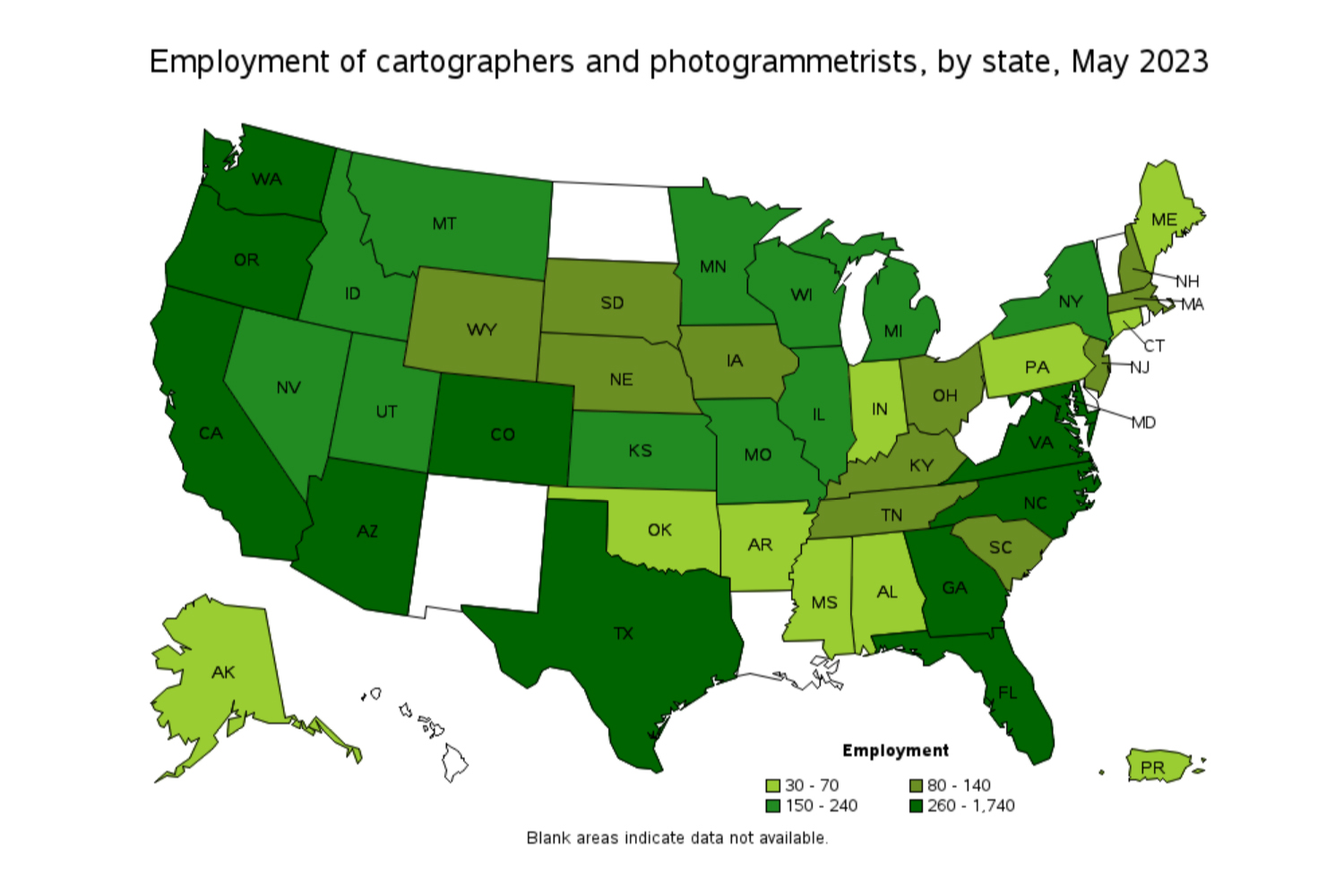Lost in longitude or confused by contour lines? Want to know all the tips and tricks for getting the most out of your atlas? Curious if paper towns still exist? "Ask a Cartographer" is your opportunity to get the facts straight from the source. Tom Vitacco, Rand McNally Publishing’s Director of GIS is here to answer your burning questions, and geek out over fascinating map lore – one exploration at a time.
This week, we are discussing careers in mapping, cartography, and GIS…
Question: I’m a student who is interested in geography and maps. What are all the career options for me?
Tom’s answer: Interesting question with a lot of potential answers! I briefly touched on this topic in an earlier post related to whether you need a degree to become a cartographer so I will try not to repeat myself too much. To answer the question, I plan to discuss geographic careers more in general terms rather than go into the specific path that led me to a career in mapping and cartography.
GIS Careers
First off, I think it is wonderful that you are interested in geography and maps since many students are not exposed to this subject in school, yet most probably use maps and spatial data every day. If you want to pursue a career in GIS, cartography or geography, then I would strongly recommend getting a degree in an associated field. Most companies will require a degree so it will be worth the time and investment to learn the basics about fundamental geographic and cartographic principles along with data manipulation and possibly even coding. There are many excellent programs at top universities, but smaller schools and community colleges will also offer classes, certificates, and degrees in this field. It is an exciting time in the Geoscience and Geospatial industries, and the Bureau of Labor Statistics often releases data to suggest the job outlook continues to trend upward.

Pictured: Rand McNally staff working in different geographic and cartographic production roles back in the 1930s and 1940s.
Career Paths to Follow
There are many different career paths and options for a career in mapping, cartography, geospatial data or geography. Usually, the degree options include titles such as Geography, Cartography or Geographic Information Systems (GIS) in the name. Geographers study the Earth and the distribution of its land, features, and inhabitants while researching the interactions between physical features and human activities within a given place or area. Cartographers, for the most part, create and produce maps.
I have a Bachelor of Science (BS) degree in Geography from Illinois State University for example, but I consider myself a cartographer trained to create and produce maps in both print and digital formats. Geographic Information Systems often store large amounts of spatial data used by businesses, governments, and individuals, and those trained in using a GIS often analyze the data to help make important decisions about development, engineering, health, safety, climate, and more. The knowledge, skills, and expertise you obtain will be an asset to a wide range of surprisingly diverse areas of employment.

Where to Work
Companies in the public and private sectors have staff with geographic backgrounds, including Rand McNally Publishing, Garmin, National Geographic, Google, Apple, Uber, AAA, Michelin…just to name a few. The U.S. Government employs many in this field, including positions with various departments or agencies such as the National Oceanic and Atmospheric Administration (NOAA), the U.S. Geological Survey (USGS), the Bureau of Land Management (BLM), the National Park or U.S. Forest Services, the Environmental Protection Agency (EPA) and the National Geospatial Intelligence Agency (formerly the Defense Mapping Agency). In fact, the federal government is one of the largest employers of geography-related positions in the United States.
State and local agencies invest in GIS solutions and manage data related to transportation, utilities, urban planning, land use and much more. The oil and gas industry utilizes staff with training in various geosciences. Real estate, public health, climate and weather, agriculture, and surveying are a few other fields to consider as well.
You can also think outside the box a bit. For example, the gaming industry can include mapping…think of Pokémon Go and how it incorporated GIS technology into a gaming experience that is still popular today. You could even go into teaching with a background in geography. I could go on and on, and I hope these examples demonstrate the potential opportunities in this field.
Job Titles
There are a lot of job titles in this field. I do not want to list too many because it is not the focus of your question, but I will share a few. For someone interested in a career in geography or mapping, job titles might include Mapping Technician, GIS Specialist, GIS Analyst, GIS Coordinator, GIS Data Manager, GIS Database Administrator, GIS Software Engineer, Surveyor, Planner, etc. In the end, the demand for people who understand mapping, spatial data and GIS should continue to grow and I am sure more titles will be added in the future.
Job Locations
Rand McNally Publishing has always been based in the Chicago area and large companies like Google and Apple are on the west coast, but in general there are jobs in geographic fields all over the country. The map below from the Bureau of Labor Statistics highlights this point in relation to cartographers and photogrammetrists (those who gather and study data and the environment using photographic patterns and images). You will notice Texas, Colorado, the West Coast, and a few southeastern states are hot spots for jobs in these disciplines. Texas is big with the oil and gas industry, while Colorado is home to companies specializing in satellite imagery as one example. So, opportunities in this field are widespread and generally most of the country will have companies who hire staff with geographic backgrounds.

Pictured: Cartographic and photogrammetrist positions throughout the US.
Thanks again for the question and I really hope you continue to explore the opportunities in the mapping and geography fields! My best advice would be to figure out what you are passionate about related to maps and geography and then explore the prospects for a future in this exciting industry.
Feel free to submit your map or cartography questions below and check back next Tuesday for another installment of "Ask a Cartographer".
Have a question for our cartographer? Email us at printproducts@randmcnally.com with “Ask a Cartographer” in the subject line and your question could be featured next.


